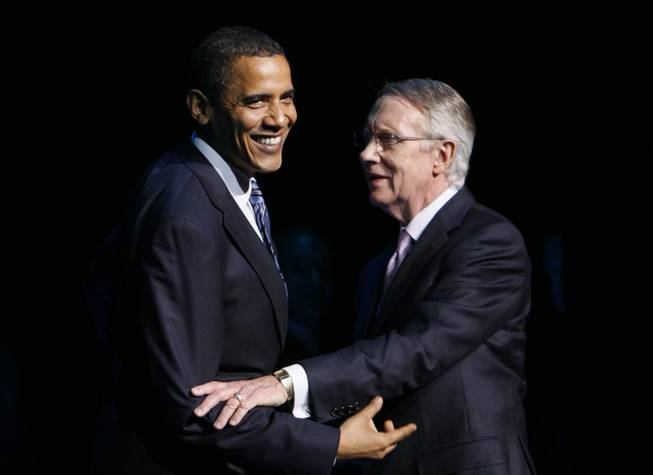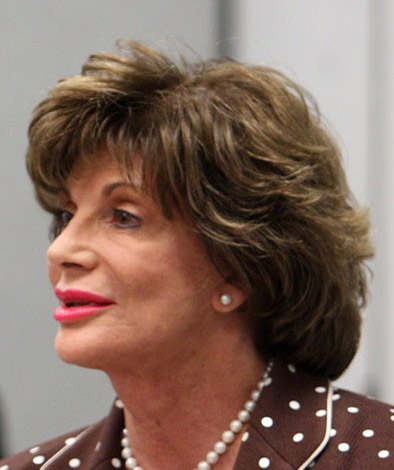
associated press file
President Barack Obama stands with Senate Majority Leader Harry Reid, D-Nev., at a fundraising event at Caesars Palace in May. Both share an increasingly close bond. Obama relies on Reid to move the White House’s agenda through the Senate. Reid needs Obama to motivate Democrats to hit the polls.
Tuesday, Jan. 19, 2010 | 2 a.m.
Sun Coverage
Boston TV report on the race
Sun Archives
- Still on Reid’s side: Friends — and juice for Nevada (1-13-09)
- Harry Reid back at White House for health care talks (1-15-10)
- Can Harry Reid keep 60 Democrats? Analyst not so sure (1-14-10)
- Harry Reid, Obama negotiate health bill at White House (1-13-10)
- ‘Tea Party’ set turns out in Las Vegas at its anti-Harry Reid finest (1-13-10)
Sun Topics
Democrats were trying to remain calm as they awaited the outcome of today’s special election in Massachusetts, recognizing that losing the seat held by the late Sen. Edward Kennedy would deal a setback to President Barack Obama’s agenda and, closer to home, the re-election campaigns of Nevada Democrats who have supported it.
In particular, the potential loss of the Democrats' critical 60-seat majority in the Senate could hurt Majority Leader Harry Reid, who has guided health care legislation -- the centerpiece of Obama's agenda -- through the Senate and will lean on its passage to show he can get things done in Washington.
A Republican victory in Massachusetts would imperil the anticipated conclusion to the hard-fought health care reform battle and cast doubt on whether Obama, who swooped into Massachusetts with an eleventh-hour campaign stop, can propel foundering candidates to victory.
Reid is linked inextricably to the Obama agenda. To hear Nevada Democrats tell it, Obama will be on the ballot again in November, in the form of Harry Reid.
Party leaders are promoting a double-ticket: Obama-Reid. If Obama is to succeed, the argument goes, he needs the Senate majority leader to shepherd the administration’s agenda through Congress.
But if Obama cannot win hearts and minds, can Reid and Nevada’s other candidates win them on his policies?
“Psychologically, it’s huge,” said David Damore, a political science professor at the UNLV. “You can’t win the most liberal state?”
Indeed, the special election could become one of those moments that defines a landmark political shift — much the way 1994 or 2006 provided game-changing electoral realignments.
Polls show Scott Brown, the pickup truck-driving Republican state senator, and Martha Coakley, the establishment-backed Democratic attorney general, in a narrowing race that political analysts said was a toss-up.
With unified Republican opposition to most of Obama’s agenda, the president acknowledged the stakes as he stumped Sunday in the state. “We know that on many of the major questions of our day … a lot of these measures are going to rest on one vote in the United States Senate,” Obama said.
Were they to lose the seat, Democrats would immediately be forced to shift to Plan B to pass the health care reform legislation that has consumed Washington for the past six months. Without 60 Democratic votes in the Senate, Republicans could halt the bill’s final passage with a filibuster.
Democrats would be left with several choices — each politically unattractive and practically difficult.
They could push to finish the bill swiftly, before the Republican is seated in the Senate.
But even if a vote was held within the 10- to 15-day window before the election is certified — which would be difficult — Democrats would expose themselves to further criticism of hardball politics.
Or Democrats could force the House to pass the Senate bill, a suggestion that has already has drawn protests from House Democrats and is off the table, according to some insiders.
This would be a particularly perilous route for Nevada’s Democratic Reps. Dina Titus and Shelley Berkley, who have taken strong stands against aspects of the Senate bill that they believe would hurt their constituents.
One House Democratic aide said Monday that no such discussions on a House-only vote are under way and that talks continue “toward a compromise bill” that both chambers could support.
Lastly, Democrats could dismantle the bill and try to pass various provisions under the reconciliation process, which only requires 51 votes in the Senate, but could result in key provisions being scrapped.
“There are challenges” in each of those options, said Judy Feder, a senior fellow at the Center for American Progress. But she said losing the health care debate would be even more difficult for Democrats. “There’s a powerful imperative to get this done fast.”
A Republican victory in Massachusetts would also likely signify the start of a more successful Republican opposition to the Obama agenda, including the health care bill. Republicans see in Brown’s candidacy a surge in voter discontent over the direction in Washington and one they hope to continue to exploit as the November election nears.
Obama has said that opponents are engaged in a “sleight of hand” — blaming Democrats for the bad economy inherited from years of Republican rule — and tapping into the resulting voter “anger and that frustration.”
“It’s the oldest play in the book,” Obama said.
Still, if Obama is unable to help Coakley, as he was unable to save the faltering campaign of New Jersey Gov. Jon Corzine, who lost his re-election in November, it may imperil Nevada Democratic candidates heading into fall.
Titus has distanced herself from Obama on some policies, but remains tied to the Democratic agenda, including the health care bill she worked to amend.
Obama is expected to make several trips to Nevada. He told Titus and House Democrats during their closed meeting last week, “I’ll be out there waging a great campaign from one end of the country to the other telling Americans with insurance or without what they stand to gain.”
A Democratic strategist tried to calm the electoral angst leading up to the special election, noting that “Massachusetts is not Nevada.”
Unlike Coakley, Reid’s campaign has taken “nothing for granted,” the strategist said. The senator has known all along that he faces an uphill battle in Nevada, where independents have been shifting away from Democrats and toward Republicans.
The Coakley camp, meanwhile, lost a 30-point lead in traditionally Democratic Massachusetts.
The Massachusetts race is “a referendum on Martha Coakley’s candidacy,” the strategist said. “I don’t think you can take this as a referendum on the entire Obama agenda.”
Sun reporter J. Patrick Coolican contributed to this report.



Join the Discussion:
Check this out for a full explanation of our conversion to the LiveFyre commenting system and instructions on how to sign up for an account.
Full comments policy